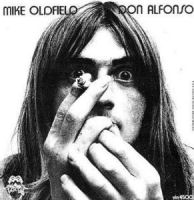Don Alfonso (song)
| "Don Alfonso" | ||||
|---|---|---|---|---|
 |
||||
| Single by Mike Oldfield (with David Bedford) | ||||
| B-side | "In Dulci Jubilo (For Maureen)" | |||
| Released | 21 February 1975 | |||
| Format | 7" vinyl | |||
| Recorded | October 1974, The Manor | |||
| Genre | Novelty song | |||
| Length | 4:20 | |||
| Label | Virgin | |||
| Songwriter(s) | Ted Waite | |||
| Producer(s) | Mike Oldfield | |||
| Mike Oldfield singles chronology | ||||
|
||||
"Don Alfonso" is the second UK single by musician Mike Oldfield, released in 1975. Side 1 has an additional credit: "featuring David Bedford on vocals". This is a comic novelty song from the early 20th century, sung by a boasting, bogus toreador, who seems to know very little about bullfighting.
This was the second time David Bedford sang on a recording of this song. He previously recorded it with Lol Coxhill as the Coxhill-Bedford Duo, who issued several singles under this name, and 3 songs on Coxhill's 1971 album Ear of Beholder, where this song appeared. All songs made under this name are revivals of early 20th century repertoire from British music hall, American Vaudeville, and minstrel shows, and feature Bedford on piano and vocals, and Coxhill on vocals. On the Coxhill album, the composer is credited as Ted Waite, a British music hall comedian, but the authorship may be in dispute, as all releases of Oldfield's version, including a recent DVD containing the video, credit it as "traditional".
The Mike Oldfield version features David Bedford on lead and harmony vocals, piano and accordion, Mike Oldfield on rhythm guitar, bass guitar and lead guitar, Chris Cutler on drums, and Kevin Ayers on wine bottles. It was recorded in October 1974 at the Manor.
Side 2 is Oldfield's first version of "In Dulci Jubilo", a traditional German Christmas carol, and is not the better-known version which was later released as his next single. Mike Oldfield plays all instruments on this version, including woodwinds, and recorded it in November 1974 at the Beacon, his home studio. Oldfield's versions have been issued with more than one composer credit; the authorship shown in the track listing above is how it appears on a recent compilation CD (containing the remake). Most editions from the 1970s and 1980s credit it to R. L. Pearsall, arr. Oldfield. Bach and Pearsall both wrote arrangements of it, but the song dates further back than either composer. Italian pressings of a single from 1975 (not the version from this record, but the re-recording) credit it to J. S. Bach.
...
Wikipedia
